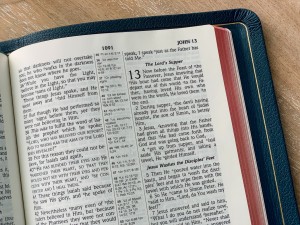
Our daughter, Sydney, would often get completely stressed out when learning something new at school. She lived with this misguided perception that she needed to be capable of operating in a skill, whether in math or language arts, before the material had been presented. She would feel anxious and place unnecessary pressure on herself when learning something new wasn’t grasped immediately or easily. There were many, many nights when Joel and I would sit with her as she wrestled her way through the emotions of fear, anger, and disappointment because of this false narrative in her mind. She didn’t understand that the whole point of going to school was to learn something new. She wasn’t in school to prove that she already knew complex fractions and how to diagram a sentence. She was in school to learn.
Anytime we do something new there is a learning curve. There is a space between starting and finishing, and the length of that space is unpredictable. It all depends on the level of complexity of the new skill, and all of the external factors – predictable and unpredictable – in which one is trying to learn this new skill.
There are many difficulties that we face in the middle of the wilderness season. There are curve balls that get thrown our way at our most vulnerable moments. Wrestling with the fear of looking incompetent is a true struggle in the middle of transition. Oftentimes, it is not the actual work that catches us off-guard, but the context in which we are doing this work that compounds the challenge and brings us into a complete state of humility (and I use that word “humility” not in the spiritual sense of a “humble heart”, but in the sense of “I have completely humiliated myself because I look inept trying to do something I’ve been doing for 20 years, but somehow here, in this context, I can’t even figure out how to spell my name” kind of humility). Learning new things can be humiliating. Especially when you are midway in your career and there is a “felt” expectation that you can perform at a significantly higher capacity than your younger counterparts.
But transition is not selective. Transition doesn’t care how many acronyms one has at the end of their name or how many years’ experience you carry on your resume. Transition doesn’t choose favorites. Transition will highlight one’s weaknesses and push all of the strengths to the bottom of the heap. Learning how to do something new, learning how to adapt to new rhythms, new structures, new cultures, new driving systems, new organizational flowcharts and protocols, is confusing, humiliating and stressful. The fear of looking incompetent will bubble up when it is least expected.
I was standing at the checkout station at one of our grocery markets in Malawi, Africa. The cashier rang up all of the items I was purchasing, and while I could see the total on the register, in my stress I could not read the number of zeros in the total. I tried to pay with my debit card, but the internet was not working (a very common issue), and I was going to have to pay with cash. At that time, the conversion rate from Kwacha to Dollars was K780 to $1. So, for instance, if I was buying $50 worth of groceries, the total in Kwacha would be approximately K39,000. That is a lot of Kwacha. To add to the complexity of it, the largest denomination they have is a K2000 bill. I cannot remember the total of my groceries on that particular day, but there were many zeros behind the number, and I found myself panicking as I was counting out my Kwacha in order to pay the bill.
An older and seasoned missionary had advised me to never pull my money out of my purse in public when counting out the Kwacha. She had also given me a little “Kwacha hack” – to divide the Kwacha into bundles of K10,000 so that, when paying a large sum, one could pull out the bundles and not have to rummage through counting out K39,000 in front of a large group of spectators.
On this particular day, even with my K10,000 bundles, my brain went blank and I couldn’t count, I couldn’t make out the total on the register, and I started to panic. I ended up handing the cashier all of the Kwacha I had in my purse so that she could count it out for me. She looked at me like I was insane, and I kind of was. My heart was pounding, beads of sweat were starting to drip down the side of my face, and I had a massive lump in my throat. The cashier began counting out the bills and returned to me a stack of unnecessary Kwacha. I have no idea what the people in the queue behind me were thinking, and by that point, I simply didn’t care. I just wanted to get the whole experience over with and get out of there as quickly as possible.
In this moment, I felt completely incompetent. Everything seemed upside down. For a split second, I could see just how much I was mentally, physically, and emotionally adapting.
Thankfully, it didn’t take me a year to figure out a system for paying for groceries and any other item I needed to purchase. While it wasn’t one big moment of enlightenment in which I figured my way out, it was, rather, that I grew into a new way of thinking, processing, and navigating the various situations I found myself in. It happened in time, but I had to embrace the reality of my incompetence and not allow that to break me or cause me to pull back. I had to keep going to the grocery store, continue to swallow my pride, and step back up to bat every single day.
Transition – this wilderness season of change – is a time of learning something new. Not much will come naturally. It will take time to decouple from the old way of doing normal to a new way of doing normal. And it will require humility. It will take all of one’s accomplishments and bury them deep underneath incompetency. The soul will have to learn how to surrender and be at peace with the process.
I know this may come across rather simplistic and theoretical. I know if I read something like what I’ve just written, I would probably wonder about the nitty-gritty of wrestling with the fear of looking incompetent. I would need some practical tools to guide me through all the discomforts of this particular component of transition. So, I am going to share a few actions steps that Joel and I took when we faced the reality of our incompetence.
Seek out safe people.
There were three missionary families that became guideposts for Joel and me throughout those early months in Malawi. They were all from different mission organizations, and they had Malawi experience that ranged from eight months to almost 15 years. Each family had insights and experience that filled in many gaps in the learning curve. While they couldn’t predict how various lessons would play out in such an unpredictable context, they could speak to the emotional and mental challenges we were working though. They became our resources for anything from schooling for our children to finding a language tutor, to visa challenges to those vulnerable moments of “I think I’m losing my mind and I just need to vent”. They were safe. They loved Jesus. And for some reason that I can’t quite understand, they loved us enough to bring us into their circle. Safe people won’t judge you when you look incompetent or are having a tough day. They won’t look at your deficiencies as character flaws, but as a normal part of the transition process. Seek these kinds of people out. They will be your life preservers.
Lower your expectations.
Most individuals who make it through the process of full missionary appointment are go-getters. They are self-driven and self-leading. They have proven their competence by jumping through the many hoops it takes to become fully appointed missionaries. They have taken multiple psychological assessments, written out pages of personal history, sat through interviews, allowed their flaws to be highlighted and discussed, read stacks of books, and sat through hours of training. These individuals are not slackers. And, I would imagine, live with high personal expectations.
While this is all good and admirable, when such individuals hit the field with the same high level of personal expectation, it can be devastating when they hit the wall of incompetency. It will feel like running into a plate glass window.
“What happened to me?”
“Why can’t I seem to get into the rhythm of this new life/culture/language/routine?”
“I feel so slow.”
“I can’t keep my eyes open past 7pm.”
“I’m hitting a wall.”
“I’m confused and disoriented.”
These are all normal feelings and experiences. They are part-and-parcel of transition. If you feel like your world has just been shaken up and chaos abounds, then know that this is normal. And it is okay to lower your expectations for a little while. Set smaller goals for yourself. Take inventory of what is critical and what can sit on a shelf momentarily. Sometimes the critical stuff is not the fun stuff- like working through the visa process or facing cultural barriers. It would be much more fulfilling to jump into the things that are safe and do not create a state of vulnerability or humility for ourselves. We, by nature, want to look strong. However, in order to push through this particular phase of transition, vulnerability and humility are essential. Lower your expectations for excellence and surrender to the learning process.
Embrace your weaknesses and lean into Jesus.
In 2 Corinthians chapter 12, the Apostle Paul writes in humility and vulnerability about the weaknesses he faces, and his complete dependence upon the grace of God. He says in verses 8-10:
“Three times I pleaded with the Lord to take it away from me (this thorn in the flesh – this struggle – weakness – something that caused him great distress but is never clarified as to what this “thorn in the flesh” actually was). But he said to me, ‘My grace is sufficient for you, for my power is made perfect in weakness.’ Therefore, I will boast all the more gladly about my weaknesses, so that Christ’s power may rest on me. That is why, for Christ’s sake, I delight in weaknesses, in insults, in hardships, in persecutions, in difficulties. For when I am weak, then I am strong.”
Facing the reality of our incompetence is essentially facing the reality of our weaknesses. With so many leadership buzz words and strategies and all the things that fill our heads and hearts and weigh us down, it is tempting to try and cover up our incompetency with skill and tactics that perpetuate this need to hide what is really going on inside of us. The truth in all of this is that we are weak people. And when thrust into an inconsistent and volatile environment, stripped of our previous identities and coping mechanisms, we have to embrace the reality of our weaknesses. When we land on the mission field, the only way to survive is to allow the vulnerability we are feeling to be exposed. We would all say that Paul was a great man of God. We wouldn’t argue with that statement. From our side of history, we see how God took this ordinary man, with all his weaknesses and flaws, and turned those flaws into a powerful expression of God’s work through him.
But he was weak.
Paul had flaws.
Paul needed Jesus.
As simplistic as this may sound, we have to lean on Jesus every single step of the painful and humiliating journey of incompetence and transition. Will you fall down and mess up and look frail and scattered and disjointed? Absolutely. Yes. Emphatically, yes. It will be the most painful part of the process.
And that is why we need Jesus so much. After we fall, we get back up and we allow God to strengthen us through our weaknesses and use us in spite of them. I think that is one of the most mystifying realities to me – that God could use me in spite of all the ways I mess up and fall down and fail.
I relate to Paul. I don’t count myself as a great leader or great missionary or even completely mentally stable (half-joking). I know how far I fail on the daily. And yet, God still chooses to use me. To use Joel. To use our family. It is mind-blowing. I think to myself, “Wow…if God can use us, then it is not a half-hearted notion that he can use anybody.”
As you wrestle through the fear of looking incompetent, give yourself the grace to rest in God’s strength and allow him to work through your weaknesses. Whether the daunting task of language learning, or the discomfort of working with people you don’t really click with. Allow him to strengthen you, refresh you, refine you, and do his work in spite of you.
Isaiah 40:29 became an anchor verse to me during our first year on the mission field. I still cling to it because it is a precious reminder to me that I am not alone, and that it is okay to admit incompetency. It says:
“He gives strength to the weary and increases the power of the weak.”
While I don’t have the time to go into the full history of this Scripture and walk you through the context in which Isaiah was prophesying, I will say this: the character of God from the day those words were spoken and written down is the same today.
God has not changed, and he continues to prove himself true to us – to be our strength, to increase our power when we are at our weakest – even when, in the eyes of man, we don’t deserve it.
His promise of strength and power will see us through the fears, the anxieties and the many moments of incompetency. We can forego the wrestling match, and lean into his grace that is all-sufficient, humble ourselves in those vulnerable and exposed moments, and allow his power to enable us to get back up and try and try again.
Remember, in this season of transition we are learning something new.
And here’s a little curve ball I’m going to throw your way…we will always be learning something new. Always. There is no finish line to the unknowns and our incompetency. For every new thing we learn, there will be a hundred more that we have yet to discover.
So, as you navigate through the early stages of transition, don’t forget to…
Find your safe people.
Lower your expectations.
Embrace your weaknesses.
And lean hard into Jesus.
Tags: 2023, Grace, Life, Ministry, missions, obedience











